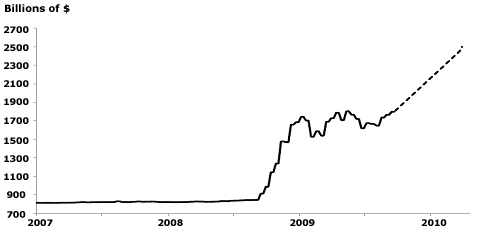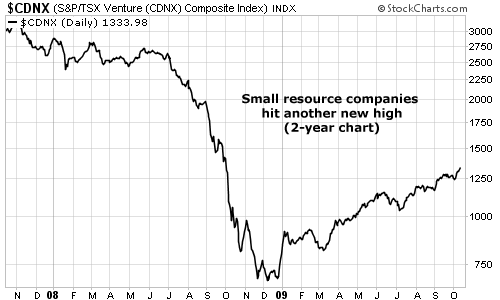| Home | About Us | Resources | Archive | Free Reports | Market Window |
The Federal Reserve Is Openly Telling You to Buy Gold and SilverBy
Thursday, October 15, 2009
At the end of last year, I began writing about what I saw happening as the Federal Reserve started assuming the liabilities of the investment banks and the federal government began deficit spending at an unprecedented pace.
I've been calling these changes the "End of America" because I believe the fiscal policies of the U.S. will result in a massive devaluation of the dollar and the end of the U.S. dollar as the world's reserve currency. To get an idea of why I'm concerned, have a look at a chart James Bullard, president of the Federal Reserve Bank of St. Louis, included in a recent presentation to the National Association for Business Economics.  What you see here is Bullard's estimate of the future growth of Federal Reserve assets. A lot of people seem to have forgotten something that is very much on Bullard's mind: The growth of the Fed's balance sheet isn't nearly finished. In fact, the Fed has only completed purchasing about half of the $1.75 trillion worth of assets it has promised to buy. The assets are mostly mortgages and mortgage-related securities. Even though these direct purchases are unprecedented, that's only about 10% of the story. Since the beginning of the crisis, the Fed has lent, spent, or guaranteed $11.6 trillion. That includes providing a backstop on the entire system of mortgage finance in the United States, a system that currently shows nearly a $1 trillion loss. Since the expansion of its balance sheet got started in earnest last fall, the trade-weighed value of the dollar has fallen 15%. Keep in mind, the Fed's assets form the base of our monetary system. The more it grows, the more money and credit become available to the banking system. And the faster the money supply grows, the more likely the value of the dollar will continue to fall. As Bullard points out, a doubling of the monetary base won't necessarily cause an immediate doubling of inflation... But suppose it takes 10 years? The average inflation rate would still be 7% a year. If inflation does grow to this average level, at least a few of those years will see inflation running at or near double digits. Nothing in our financial markets is prepared for this kind of inflation. Inflation at these rates would cause the average multiple of earnings for equities to fall by at least 50%. Likewise, we would see high-yield corporate bonds yielding at least 20% – double what they are now. And U.S. Treasuries would probably see their yields triple. The destruction of wealth in the bond markets would be unprecedented in modern finance. It's going to happen. I guarantee it. My forecast only assumes the Fed's actions don't continue past what's been announced so far. My bigger concern is what happens if Congress decides the Fed did such a good job fixing the housing bubble that perhaps it should lend a hand on health care or the entitlement time bomb? Although a small handful of people have been writing about the enormous fiscal challenges that all the Western democracies face over the next decade, I'm sure most of today's equity investors don't really understand what lies ahead. Consider these numbers: Right now, today, without counting any of the unfunded liabilities of our government (which are very real obligations, by the way), our national debt is $12 trillion. There are roughly 100 million American households. So that's a national debt of roughly $120,000 per family. That's more than the average American owes on his mortgage. Think about what this means in terms of interest payments. Even with interest rates at all-time lows around the world, the U.S. will spend almost $400 billion on interest to service our existing national debt – that's a 3.3% interest rate. Currently, the U.S. takes in roughly $2 trillion in taxes, half of which come from income taxes. So the interest on our debt is already consuming 20% of all tax receipts, or 40% of all income taxes. It seems obvious to me this money will never be repaid – could never be repaid. The only real question is how much of a "haircut" our creditors are willing to accept in terms of the loss of purchasing power of the U.S. dollar. So far, inflation remains relatively benign. Our creditors don't seem to be losing very much. But we know this will change and could change rapidly, as the Fed continues to expand its balance sheet with less and less creditworthy assets. At what point will our creditors finally decide they can't finance any more of our deficit spending because we're simply not worth the risk? No one in Washington realizes you can't borrow money endlessly. By the time Barack Obama leaves office (assuming he is reelected), the national debt will likely exceed $20 trillion. What will our creditors charge us to finance this debt? How will our debts compare to the value of our economy? It is impossible to know what will happen. But here's the one thing that seems most obvious: Our borrowing costs will go up, a lot. At some point in the next few years, our creditors are going to stop believing in our ability to pay our debts in honest money. I don't know what will break first, but we can't go on printing money to prop up our banks and spending money we don't have to prop up our culture of entitlement. And I don't believe there's any way to avoid it – certainly not with the political system we have in place right now. To protect yourself, you'll have to be very good at managing your assets. You also need to make sure to take the advice we've been issuing for years: Buy and hold plenty of real, honest money that cannot be debased by the government. Buy and hold plenty of gold and silver. Good investing, Porter Stansberry P.S. I'm a much bigger fan of silver right now than I am of gold. I even devoted a good portion of my most recent investment advisory to why I think the metal could return you more than 500% in the coming years. To learn how to become a subscriber and access this issue, click here.
Further Reading:
How to Protect Yourself from the End of America Market NotesA SECTOR YOU NEED TO GET TO KNOW IMMEDIATELY
Major news in the commodity markets this week: Crude oil just hit a fresh 2009 high. It's more fuel for the fire under small resource stocks.
Longtime DailyWealth readers know we keep a close eye on the universe of small companies that explore for and produce resources like crude oil, uranium, copper, gold, and platinum. They're among the most explosive assets in the world. Rising commodity prices cause huge increases in their asset values and earnings power. Plus, investors love this "story" and often pile into this small sector with lots of money. We track small resource companies with the Canadian Venture Index. We wrote them up as a sector with major rebound potential right at the index's bottom in mid-December. As scripted, the Venture is climbing along with the reflating of gold and energy prices... and just reached a new high this week. We've stated it once and we will state it again: As precious metals and energy prices remain robust, this sector will crank out triple-digit winners like Detroit, er, Japan cranks out cars. Traders must be "up" on this market! 
|
In The Daily Crux
Recent Articles
|

